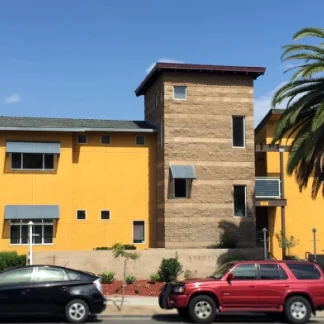Alvarado Parkway Institute Behavioral Health System Outpatient Services
Alvarado Parkway Institute Behavioral Health Systems Outpatient Treatment is loc...
Stepping Stone of San Diego Residential, located in San Diego, California, provides alcohol and drug rehab services and mental health treatment to individuals struggling with addiction. Their residential program is provided to adolescents and adults in an age-specific format.
The residential program provides individual therapy, group therapy, family therapy, stabilization and acute intervention services, evidence-based treatment interventions, personalized treatment plans, day passes to allow individuals to attend meetings off-site, educational programming, and skills-building classes. This is an open program that welcomes people from all walks of life. They are LGBTQ-friendly.
The aftercare program is designed to help individuals continue a maintenance program upon completing the residential stay. Mental health counseling, self-help groups, alumni groups, and other ways of utilizing a person’s resources to support them in maintaining their recovery.
Stepping Stone of San Diego Residential accepts most insurance plans, including Amerigroup, Anthem, Blue Cross Blue Shield, Magellan, ComPsych, and more. Out-of-network benefits may vary, so it is important to verify coverage with the provider before starting treatment.
Contact us for more information: (619) 278-0777

Connect with Stepping Stone of San Diego - Residential by calling their admissions team directly.
(619) 278-0777 Website Get DirectionsCognitive Behavioral Therapy (CBT) is a therapy modality that focuses on the relationship between one's thoughts, feelings, and behaviors. It is used to establish and allow for healthy responses to thoughts and feelings (instead of unhealthy responses, like using drugs or alcohol). CBT has been proven effective for recovering addicts of all kinds, and is used to strengthen a patient's own self-awareness and ability to self-regulate. CBT allows individuals to monitor their own emotional state, become more adept at communicating with others, and manage stress without needing to engage in substance abuse.
In individual therapy, a patient meets one-on-one with a trained psychologist or counselor. Therapy is a pivotal part of effective substance abuse treatment, as it often covers root causes of addiction, including challenges faced by the patient in their social, family, and work/school life.
Motivational Interviewing (MI) is a clinical approach to helping people with substance abuse issues and other conditions shift behavior in positive ways. It is more goal-oriented than traditional psychotherapy, as MI counselors directly attempt to get clients to consider making behavioral change (rather than wait for them to come to conclusions themselves). Its primary purpose is to resolve ambivalence and help clients become able to make healthy choices freely.
In individual therapy, a patient meets one-on-one with a trained psychologist or counselor. Therapy is a pivotal part of effective substance abuse treatment, as it often covers root causes of addiction, including challenges faced by the patient in their social, family, and work/school life.
Motivational Interviewing (MI) is a clinical approach to helping people with substance abuse issues and other conditions shift behavior in positive ways. It is more goal-oriented than traditional psychotherapy, as MI counselors directly attempt to get clients to consider making behavioral change (rather than wait for them to come to conclusions themselves). Its primary purpose is to resolve ambivalence and help clients become able to make healthy choices freely.
Motivational Interviewing (MI) is a clinical approach to helping people with substance abuse issues and other conditions shift behavior in positive ways. It is more goal-oriented than traditional psychotherapy, as MI counselors directly attempt to get clients to consider making behavioral change (rather than wait for them to come to conclusions themselves). Its primary purpose is to resolve ambivalence and help clients become able to make healthy choices freely.
Alvarado Parkway Institute Behavioral Health Systems Outpatient Treatment is loc...
Dresher Street Sober Living, located in San Diego, California, is a sober living...
Located in the Mission Valley district of San Diego, California, VA San Diego He...
San Diego Center for Children - Armstrong Street, located in San Diego, Californ...